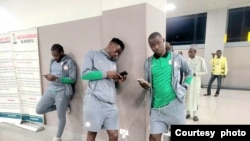Controversy continues to escalate between Nigeria and Libya over the dispute that led Nigeria to boycott the ongoing qualifying match between its Super Eagles and Libya’s Mediterranean Knights for the 2025 African Cup of Nations (AFCON).
Testifying in front of the Confederation of African Football disciplinary committee on Oct. 20, Libya and Nigeria presented opposing narratives to the investigators.
The conflict started when Libyan authorities unexpectedly diverted Nigerian Super Eagles team's flight, which was bound for Benghazi, to Al Abraq Airport in the city of Bayda.
The return leg match was to be played near Benghazi.
The Super Eagles were stranded for over 18 hours at the Al Abraq Airport with no accommodation or food.
The Nigeria Football Federation wrote a protest letter to the Confederation of African Football, complaining of Libyan officials' unacceptable treatment of their team.
Libya did not deny Nigeria's Super Eagles claims and offered an apology.
However, while calling it a logistical failure, the Libyan Football Federation signaled the incident could have been in retaliation for the "challenges" that the Mediterranean Knights faced a week earlier in Nigeria.
The federation posted on X pictures and videos of its national team members lying on the floor at Port Harcourt Airport, saying they had been stranded there for three hours, waiting for a bus to transport them 200 kilometers away to their hotel.
The videos and images went viral, attracting over 929,000 views, when X influencer “Libyan Football” shared them with a caption, saying “The same thing, and even worse, happened to Libya in Nigeria last week.’’
That is likely true.
News outlets in Nigeria and Libya reported, citing Mediterranean Knights Captain Faisal Al-Badri, that Nigerian authorities denied their chartered private jet landing rights at Uyo Airport, which is closer to the match venue, Uyo Stadium, after the team landed in Nigeria on Oct. 8. Al-Bardi also complained their luggage was searched for more than an hour.
"On the insistence of the Nigerian government, we landed at Port Harcourt even though we travelled on a private plane, and there was an airport close to the city we wanted to play in," Al-Badri said.
In one of the videos posted by Libyan Football Federation, team members complain of being taken "through forest and jungle roads in the middle of the night without any security escort."
On Oct. 10, the Nigerian Football Federation assistant director, Emmanuel Ayanbunmi, denied the mistreatment, saying that “the Libyan Football Federation created chaos for its own team.’’ He claimed the Libyan counterparts notified him too late of their team’s arrival in Nigeria.
However, this is not the first incident in which the Nigerian Football Federation has been accused of mishandling competitors, sometimes forcing them to land in airports far away from the match venue.
In June, South African national team Bafana Bafana reported to have gone through a similar ordeal during the 2026 FIFA World Cup qualifier.
The team landed at the same airport, Port Harcourt, but by the time the immigration officials cleared it to fly to Uyo, the Uyo airport had already been closed.
Although the Bafana Bafana flight had a six-hour delay in takeoff from South Africa, it experienced further delays in Nigeria while transferring from one airport to another.
The journey that would have taken them six hours from South Africa to Nigeria took 18 hours.
In a recent interview with the Nigerian TV Channel Arise, Nigeria's Minister of Sports Development John Enoh Owan said that in both the South Africa and Libya incidents, the teams chose to land at the wrong airport and alerted the Nigerian authorities of their journeys mid-flight.
But Nigeria’s history of such incidents goes further back. In March 2013, the Kenyan Football team Harambee Stars was stranded in Lagos, after a connecting charter to Calabar in Southern Nigeria allegedly left before the team landed for the 2014 World Cup qualifier.
The team accused Nigerian sports authorities of denying them proper facilities and having to train in dusty fields and sleep in substandard hotels.
In November 2022, Nigeria’s Plateau United players reportedly went through a similar experience in Libya.
Assistant Manager Fidelis Ikechukwu told Nigerian Info FM that his assistant coach ''was not allowed to sit on the bench.'' The fans threw objects at them, and ''they would pee in plastic bottles and throw them at us on the bench."





